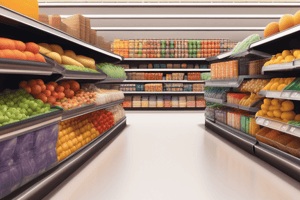Podcast
Questions and Answers
When was the first supermarket dated back to?
When was the first supermarket dated back to?
1916
What was the nature of shopping until the beginning of the twentieth century?
What was the nature of shopping until the beginning of the twentieth century?
Specialized
What was the impact of supermarkets buying goods in bulk?
What was the impact of supermarkets buying goods in bulk?
Sell them cheaper than smaller stores
What is a drawback some people find with supermarkets?
What is a drawback some people find with supermarkets?
What made shopping more convenient with the introduction of trolleys?
What made shopping more convenient with the introduction of trolleys?
How did shopping change in the second half of the twentieth century?
How did shopping change in the second half of the twentieth century?
What are flea markets known for?
What are flea markets known for?
What led to the growth of supermarkets?
What led to the growth of supermarkets?
What was the traditional way of shopping before the rise of supermarkets?
What was the traditional way of shopping before the rise of supermarkets?
Why did people start doing big shopping trips for the whole week or month?
Why did people start doing big shopping trips for the whole week or month?
Flashcards are hidden until you start studying
Study Notes
Vocabulary
- Monetary refers to anything related to money.
- To go bad indicates that something, especially food, becomes spoiled.
- To wear out means something becomes worn or damaged over time.
- To negotiate involves discussing terms and pricing before making a deal.
- Establishment refers to any business or organization that provides goods or services.
- Flea market is a type of market selling second-hand goods, often at lower prices.
- Bargain means a purchase made at a favorable price.
Shopping Evolution
- The variety of goods in shops can include items from different historical periods, some dating back to the early 20th century.
- While many items in flea markets may be considered junk, it is possible to find valuable items at low prices.
- Specialized stores exist, such as antique shops, second-hand bookshops, furniture outlets, and record stores.
Online Shopping
- Increased popularity of online shopping allows for the convenience of purchasing goods from home using a computer and a credit card.
- Online shopping eliminates common in-store issues such as long queues and lack of parking.
- E-commerce platforms like eBay serve as digital equivalents of second-hand stores but can sacrifice the personal interaction of traditional shopping.
History of Trade
- The act of buying and selling has been a fundamental human activity, beginning with bartering—exchanging goods directly without money.
- The Babylonians are credited with creating the first monetary system, allowing for a more efficient method of trade than bartering.
- Money provides unique advantages: it is transferable, doesn’t spoil like food, and doesn’t wear out like clothing.
Changes in Shopping Practices
- The introduction of money facilitated the development of shops, shifting from casual bartering to fixed price shopping.
- Haggling was historically common; however, it is less prevalent in Western cultures today compared to regions in Asia and the Middle East.
- As markets transitioned from temporary bazaars to permanent stores, the shopping experience evolved into a more efficient, albeit less interactive, process.
Studying That Suits You
Use AI to generate personalized quizzes and flashcards to suit your learning preferences.





